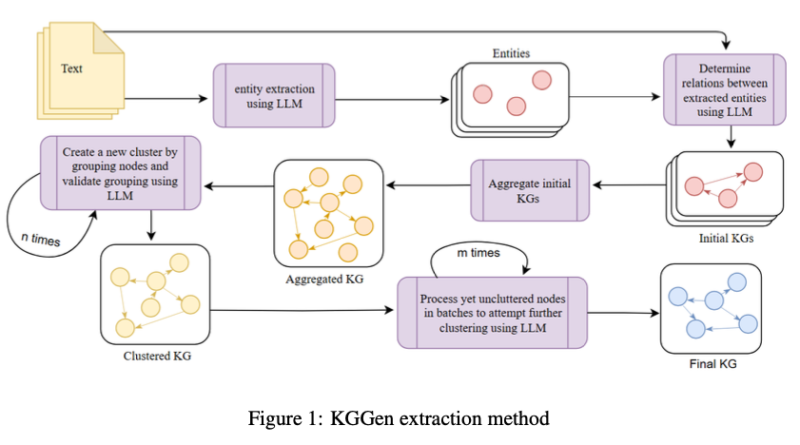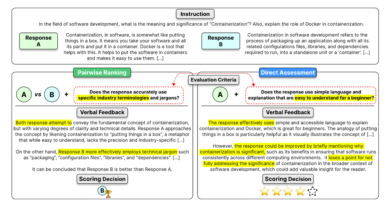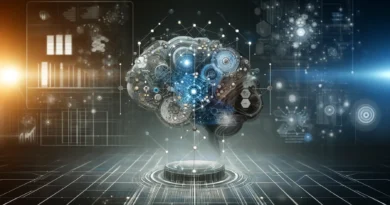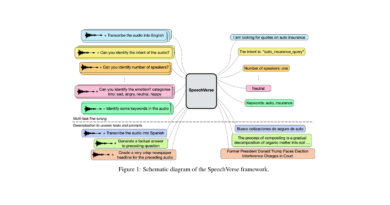KGGen: Transforming Knowledge Graph Extraction with Language Models and Clustering Techniques
Knowledge Graphs (KGs) are essential tools for artificial intelligence (AI), enhancing tasks such as retrieval-augmented generation (RAG), natural language processing (NLP), and semantic search. However, traditional knowledge graphs—such as DBpedia and Wikidata—often suffer from incompleteness, redundancy, and lack of structured relationships, which limit their effectiveness.
Traditional Open Information Extraction (OpenIE) and GraphRAG methods have attempted to bridge this gap, but they struggle with low entity resolution consistency, sparsity in connectivity, and poor generalizability. To tackle these challenges, researchers from Stanford University, the University of Toronto, and FAR AI have introduced KGGen, a novel framework that leverages language models (LMs) and clustering techniques to extract structured knowledge from unstructured text effectively.
The Need for an Advanced Knowledge Graph Extraction Model
The two primary challenges in knowledge graph extraction include:
- Sparsity and Redundancy:
- Existing methods generate fragmented knowledge with redundant relationships, leading to poorly connected graphs that hinder reasoning and inference.
- OpenIE techniques produce complex (subject, relation, object) triples that often contain duplicate or contradictory information, reducing efficiency.
- Inconsistent Entity Resolution and Generalization:
- Many techniques fail to disambiguate entities effectively, leading to incorrect mappings and disconnected relationships.
- GraphRAG, which combines graph-based retrieval and language models, improves entity linking but struggles to generate densely connected, structured graphs required for downstream AI tasks.
Enter KGGen: A New Approach
KGGen introduces a hybrid approach by combining language models with clustering techniques, ensuring that extracted knowledge is well-structured, dense, and coherent.
How KGGen Works
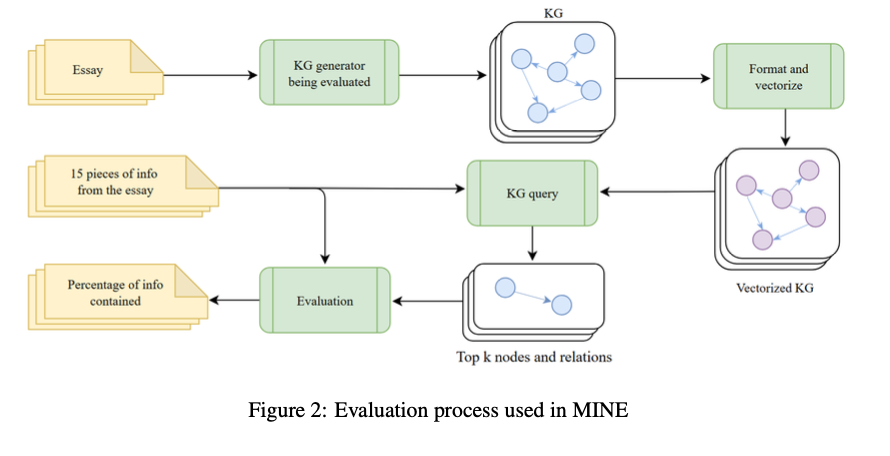
KGGen operates as a modular Python package with specialized components for entity and relation extraction, aggregation, and clustering.
1. Entity and Relation Extraction
- KGGen utilizes GPT-4o to extract structured triples (subject, predicate, object) from raw unstructured text.
- Unlike OpenIE, which struggles with redundant entity generation, KGGen filters and refines extracted relationships before adding them to the knowledge graph.
2. Aggregation and Graph Structuring
- Extracted triples from multiple sources are merged into a unified knowledge graph.
- KGGen enforces semantic consistency, ensuring that similar entities are grouped and ambiguous ones are resolved.
3. Clustering for Enhanced Knowledge Representation
- KGGen employs an iterative clustering algorithm to:
- Merge synonymous entities
- Group similar relationships
- Enhance connectivity between nodes
- This step significantly reduces data sparsity and improves graph coherence.
4. DSPy for Structured Constraints
- KGGen integrates DSPy to enforce strict constraints on the language model outputs, ensuring that high-fidelity extractions are obtained.
- This results in more reliable, well-connected knowledge graphs optimized for AI-based applications.
Performance Benchmarks: How Does KGGen Compare?
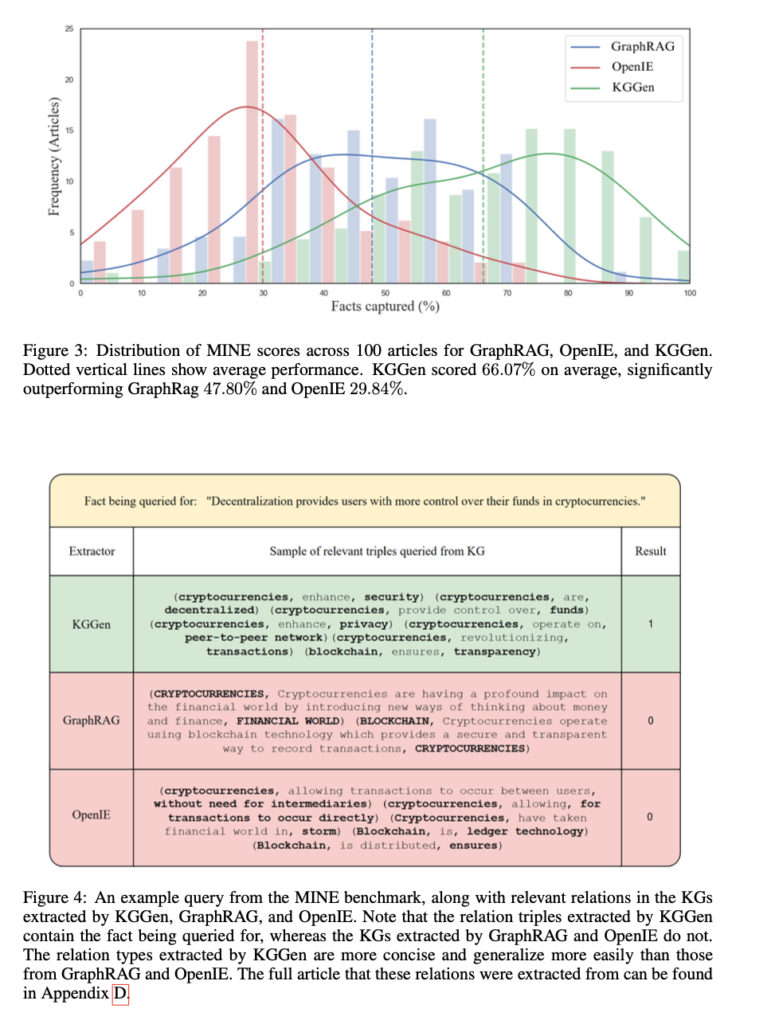
To measure the effectiveness of KGGen, researchers introduced MINE (Measure of Information in Nodes and Edges)—a new benchmark for evaluating text-to-KG extraction performance.
KGGen outperformed existing methods:
| Method | Accuracy (%) |
|---|---|
| KGGen | 66.07 |
| GraphRAG | 47.80 |
| OpenIE | 29.84 |
Key Findings:
- 18% improvement in extraction fidelity compared to GraphRAG.
- Dense and informative knowledge graphs, making them ideal for AI-driven reasoning and retrieval.
- Better performance in large-scale knowledge extraction, ensuring that AI models can operate with higher contextual awareness.
Why KGGen is a Game-Changer
- Enhanced Knowledge Extraction
- Extracts structured, high-fidelity knowledge directly from text.
- Reduces redundancy and improves entity resolution.
- Improved AI Reasoning and Retrieval
- More coherent and interconnected knowledge graphs lead to better AI performance in reasoning tasks.
- Strengthens semantic search and retrieval capabilities.
- Benchmark-Driven Validation
- First knowledge graph extraction method validated with MINE benchmark, ensuring measurable improvements over existing techniques.
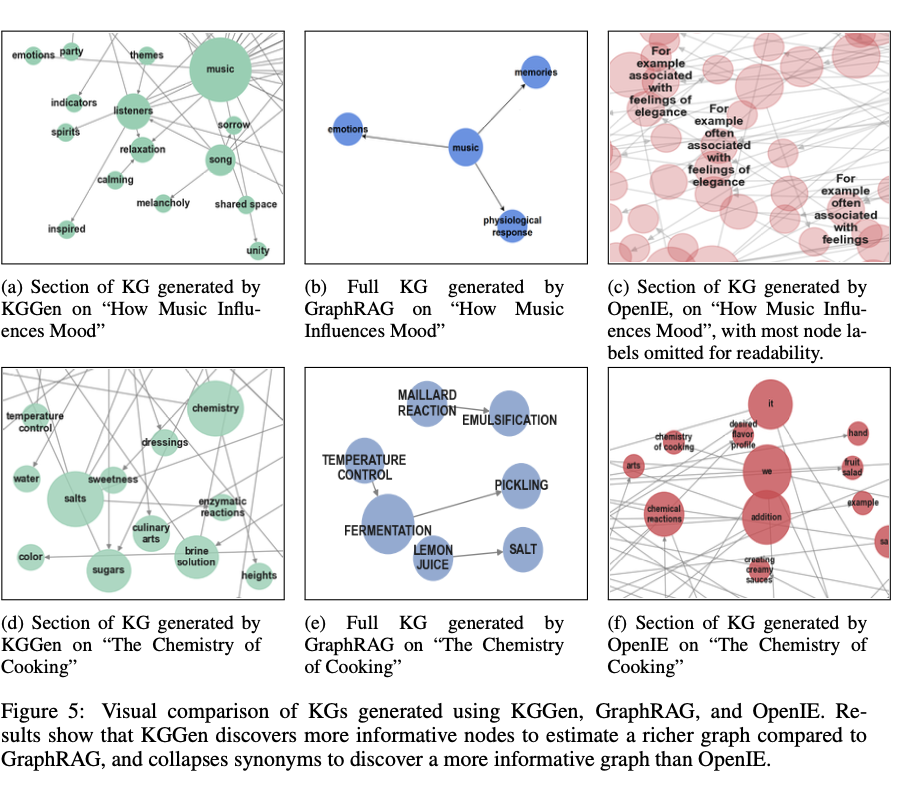
Future Developments and Applications
KGGen is poised to revolutionize multiple AI and NLP applications:
- Retrieval-Augmented Generation (RAG):
- KGGen can enhance chatbot knowledge bases, making LLMs more contextually aware.
- Semantic Search & Enterprise Knowledge Management:
- More precise and interconnected knowledge graphs will significantly improve search relevance.
- Expanding AI’s Knowledge Representation:
- KGGen can be used to continuously refine and expand large-scale knowledge bases, making AI models smarter over time.
Next Steps:
- Further refinement of clustering techniques to optimize large-scale datasets.
- Expanding benchmark testing to ensure scalability across different domains.
Conclusion
KGGen marks a significant advancement in knowledge graph extraction, combining language models and clustering techniques to generate highly structured, well-connected knowledge representations. By achieving superior accuracy on the MINE benchmark, it sets a new standard for AI-driven knowledge retrieval and reasoning.
As AI applications continue to grow, models like KGGen will play a crucial role in making AI smarter, more reliable, and better at understanding complex relationships.
Check out the Details. All credit for this research goes to the researchers of this project.
Do you have an incredible AI tool or app? Let’s make it shine! Contact us now to get featured and reach a wider audience.
Explore 3800+ latest AI tools at AI Toolhouse 🚀. Don’t forget to follow us on LinkedIn. Do join our active AI community on Discord.
Read our other blogs on LLMs 😁
If you like our work, you will love our Newsletter 📰

